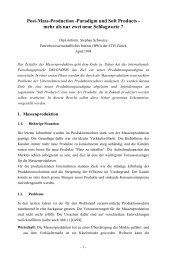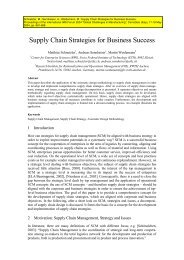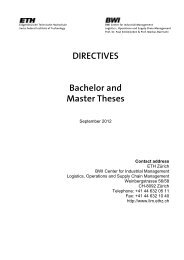The China Venture
The China Venture
The China Venture
Create successful ePaper yourself
Turn your PDF publications into a flip-book with our unique Google optimized e-Paper software.
After the decision for the investment structure has been taken, central issues for PRC<br />
investors are the composition of capital and extent of participation as well as the best<br />
financing option. Choosing the right structure can significantly affect profitability further<br />
down the road. 54<br />
For foreign invested enterprises, <strong>China</strong> is a new site. According to Western standards, the<br />
financial institutions and instruments in <strong>China</strong> for debt financing are underdeveloped.<br />
Because of the stage of economic development and the system - that is to be reformed - it is<br />
difficult for companies to raise debt capital from international financial markets. For every<br />
investment it is therefore necessary to systematically analyse the possibilities and boundaries<br />
of debt financing for foreign companies, which must encompass the short-term as well as the<br />
long-term debt financing forms.<br />
FIEs, especially their foreign investors, are exposed as in most developing countries, also in<br />
<strong>China</strong> to the currency risk, that means the exchange rate risk and the transfer risk. <strong>The</strong> foreign<br />
currency problem is intensified on the one hand because of the big demand for foreign<br />
exchange for buying materials from abroad and for paying the dividends for foreign investors,<br />
and on the other hand through the difficulties of earning foreign exchange in the start up<br />
phase. FIEs’ finance management has to solve most of all problems of equity financing, debt<br />
financing and currency management. <strong>The</strong>se three issues shall be analysed in the following. 55<br />
2.3.3.1 Equity financing<br />
Every FIE in <strong>China</strong> is required to have a certain amount of registered capital, as specified in<br />
its approval documents. According to these approval documents, the foreign investor’s<br />
minimum share of equity capital must amount 25 % of the whole capital of the enterprise.<br />
Unless such registered capital is contributed, which must be done in a manner in accordance<br />
with Chinese law, the foreign enterprise cannot exist as a legal entity in <strong>China</strong>. Aside from the<br />
obvious method of investing registered capital in the form of cash, there are several other<br />
ways of contributing the required amount to the venture which may save a foreign investor<br />
money. Commonly, local partners have little cash to invest. <strong>The</strong>refore, the Chine se company<br />
often may provide machinery, land-use rights and factories, or other assets as their portion of<br />
the investment, its share of registered capital (all of which are inherently difficult to value).<br />
Only a few local enterprises have readily accessible cash. <strong>The</strong>ir very desire for a joint venture<br />
54 Pausenberger/Völker, 1985, p. 21-24.<br />
55 Pausenberger 1980, pp. 53 and Pausenberger/Glaum, 1993, p. 764 -768.<br />
42






